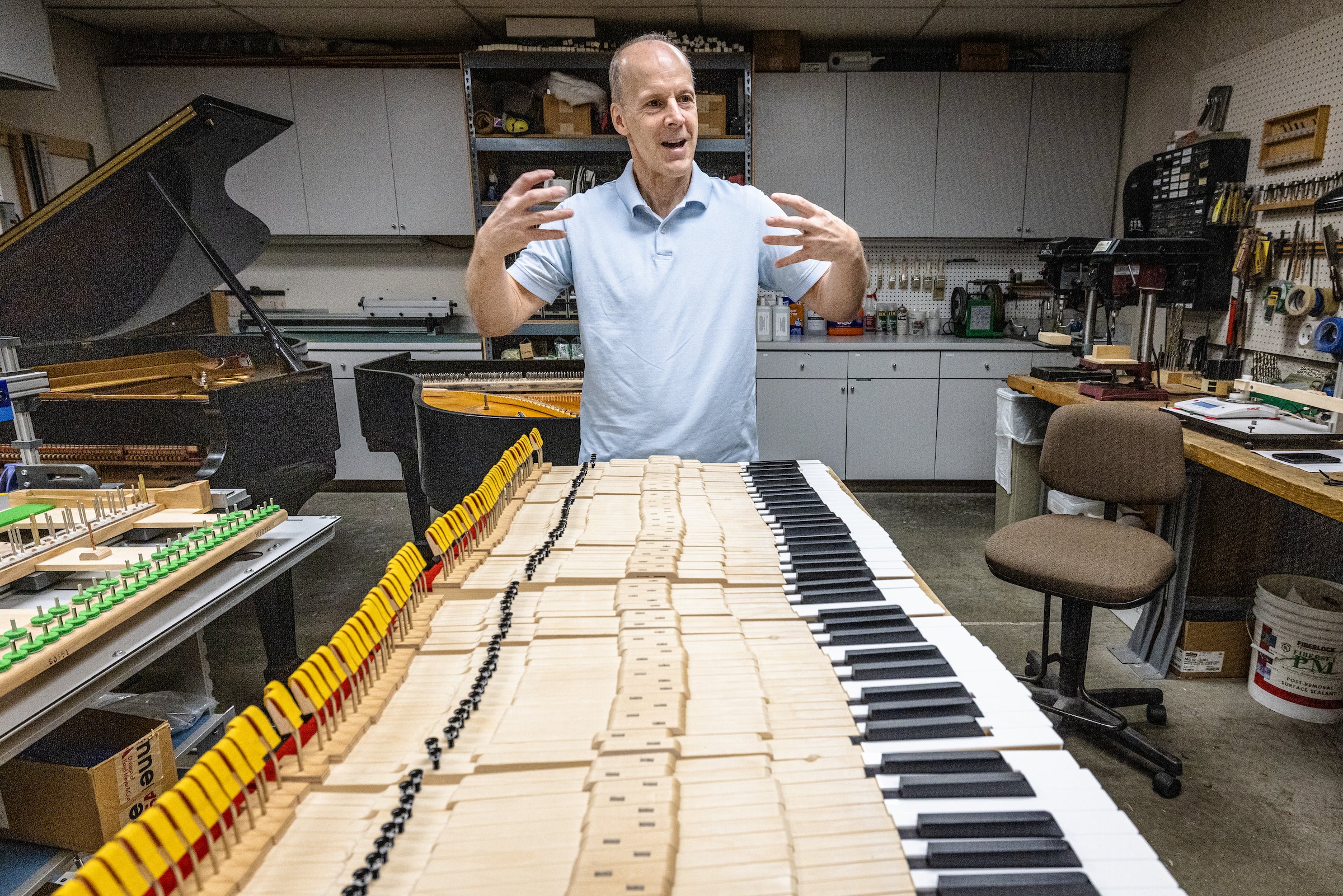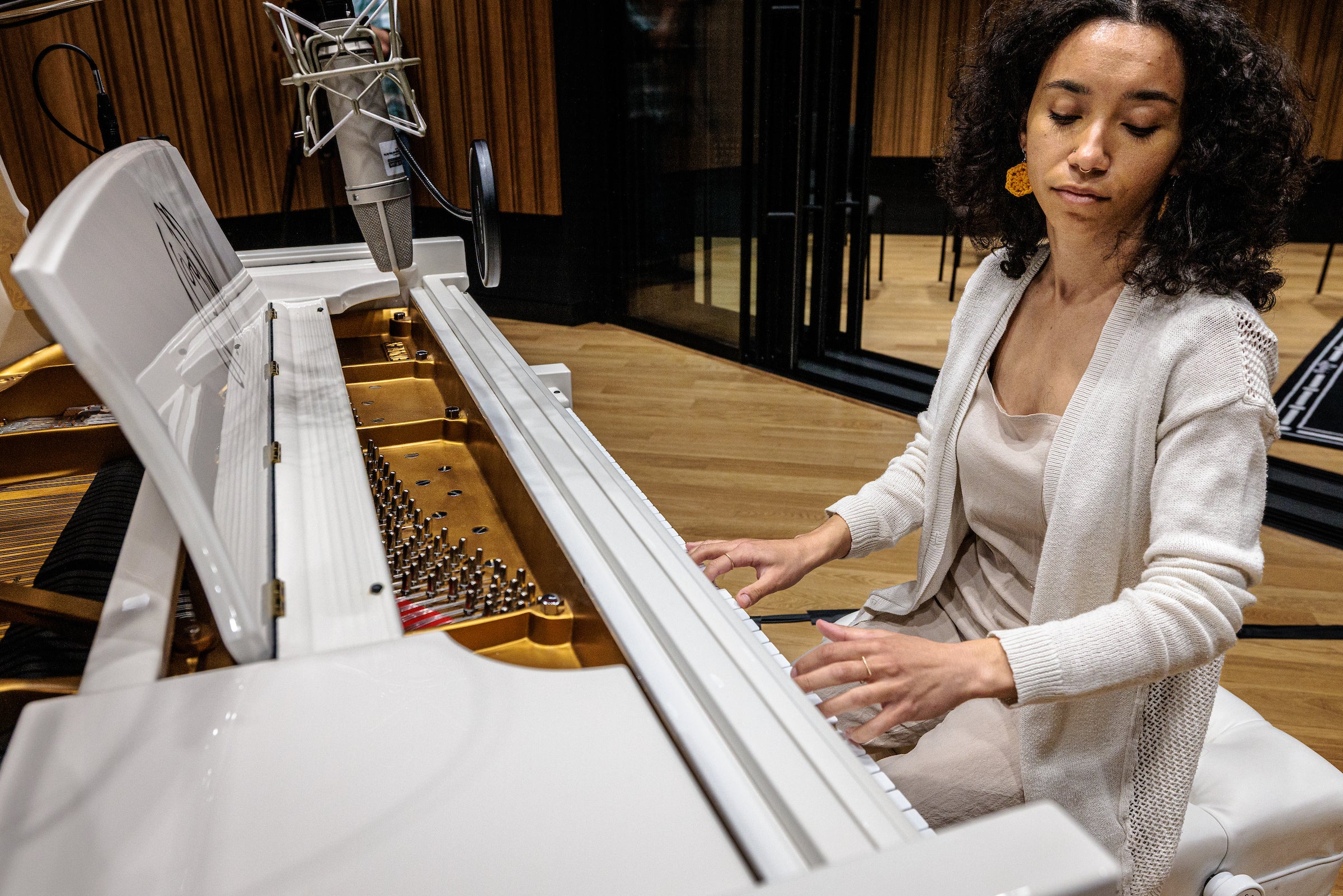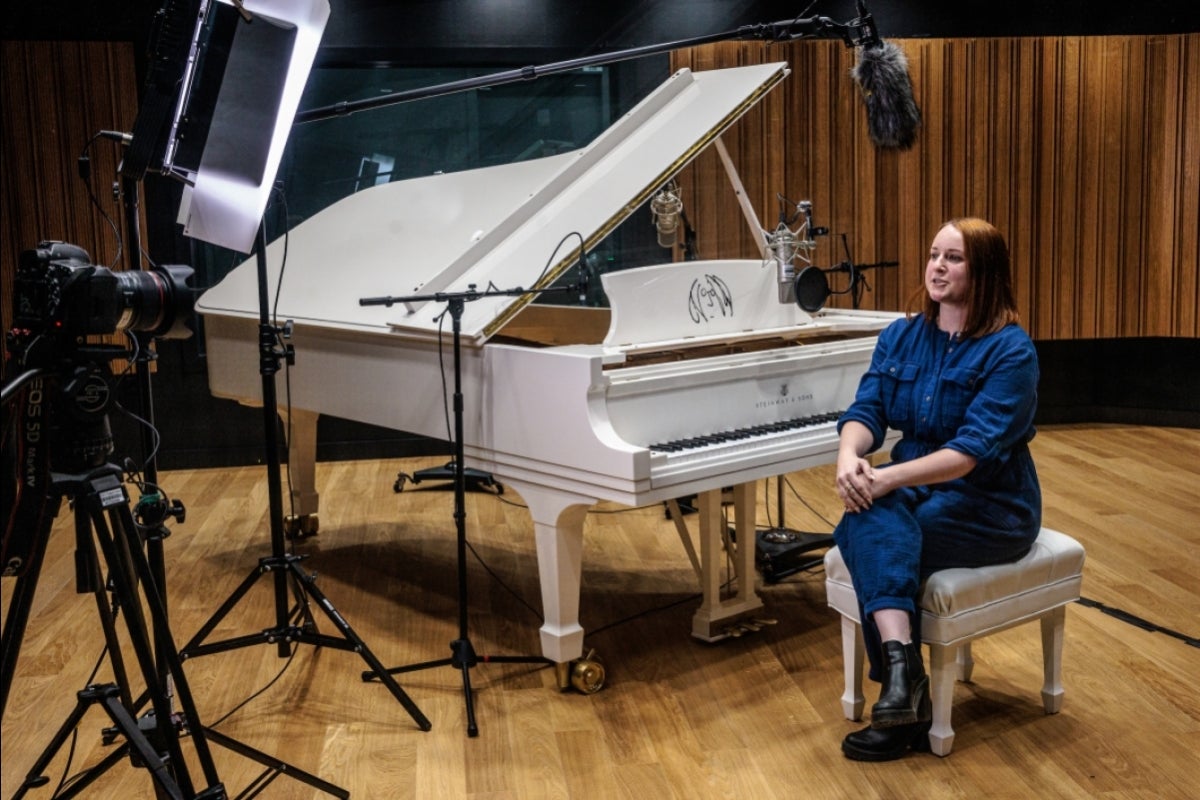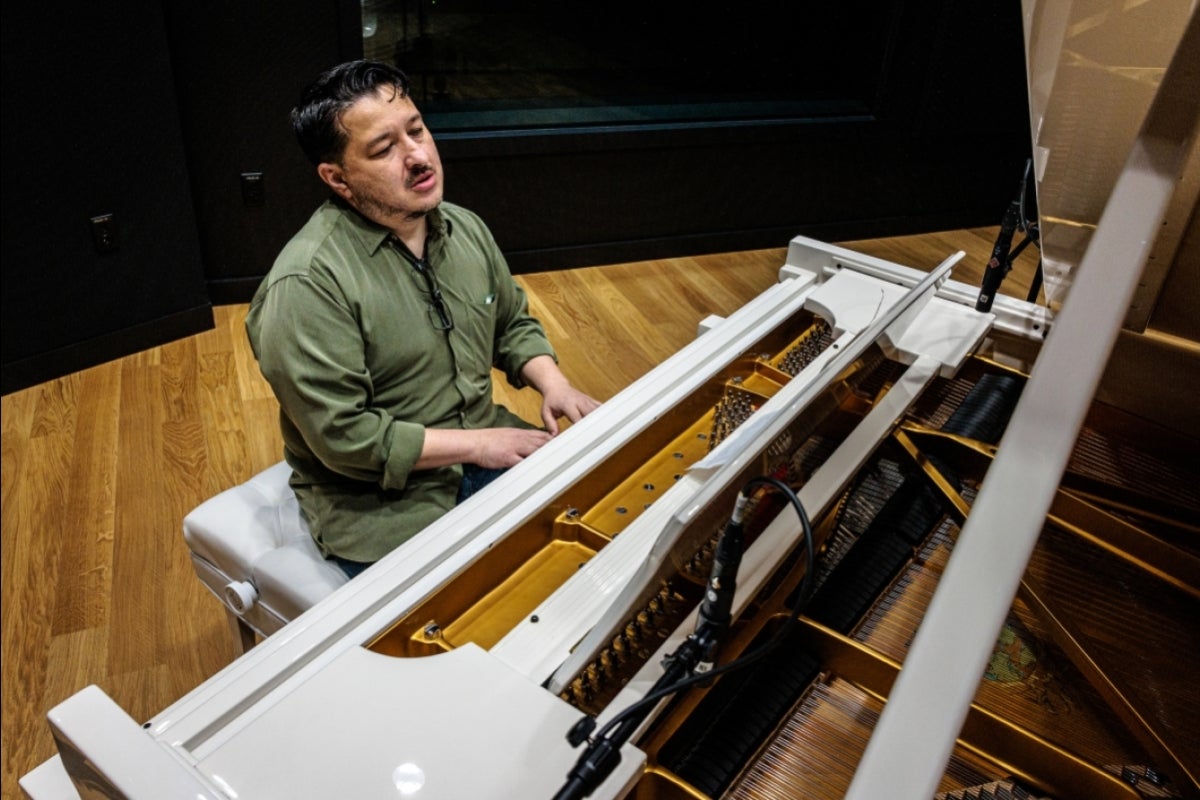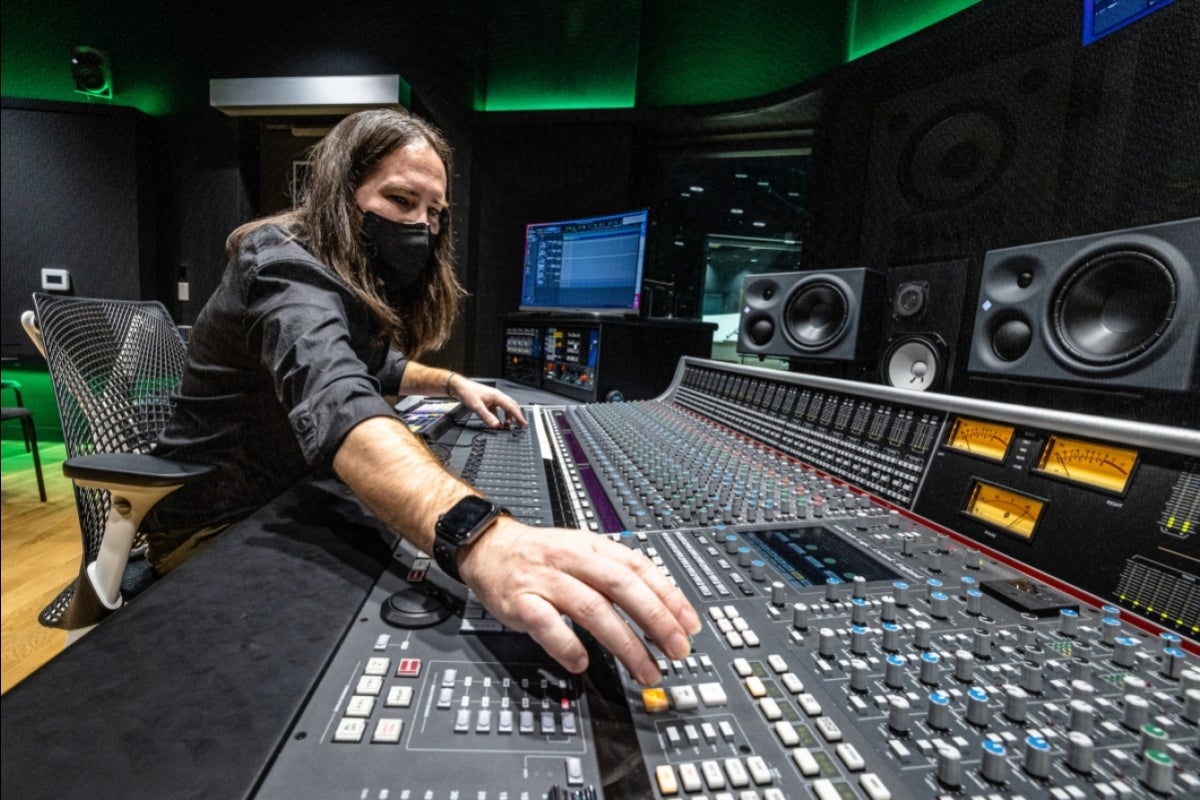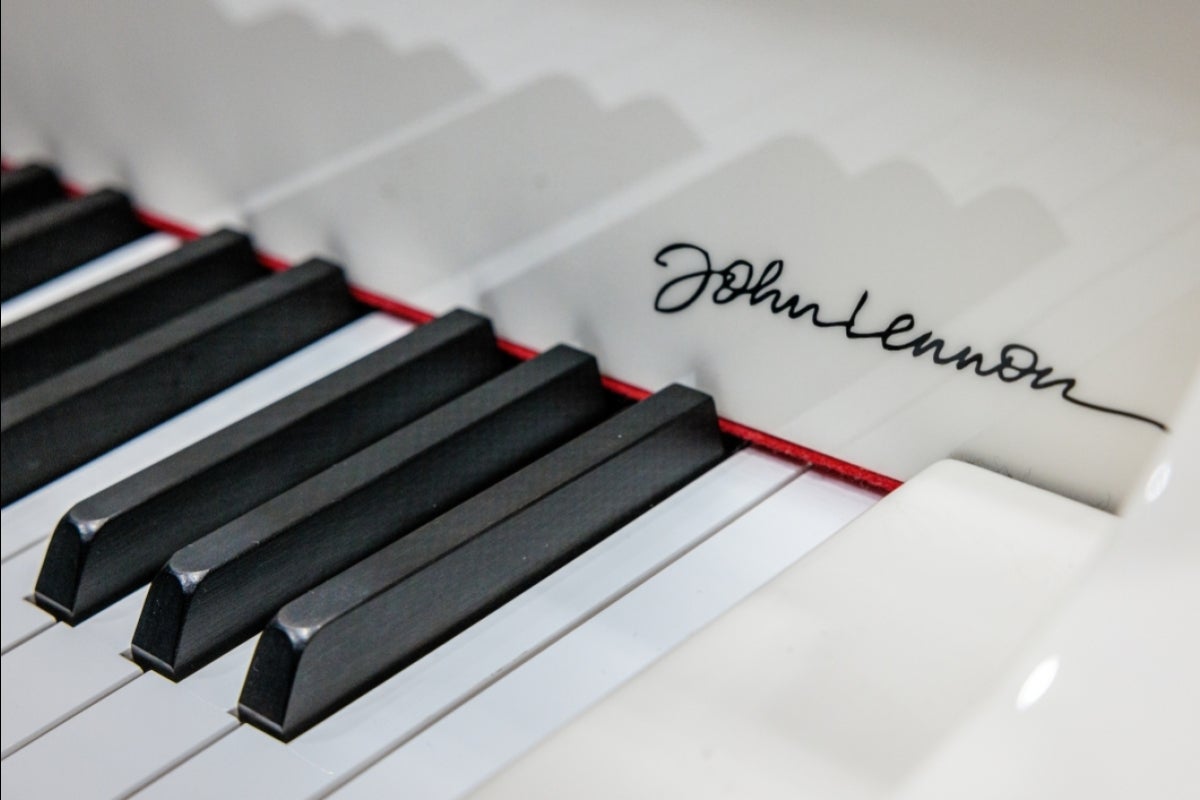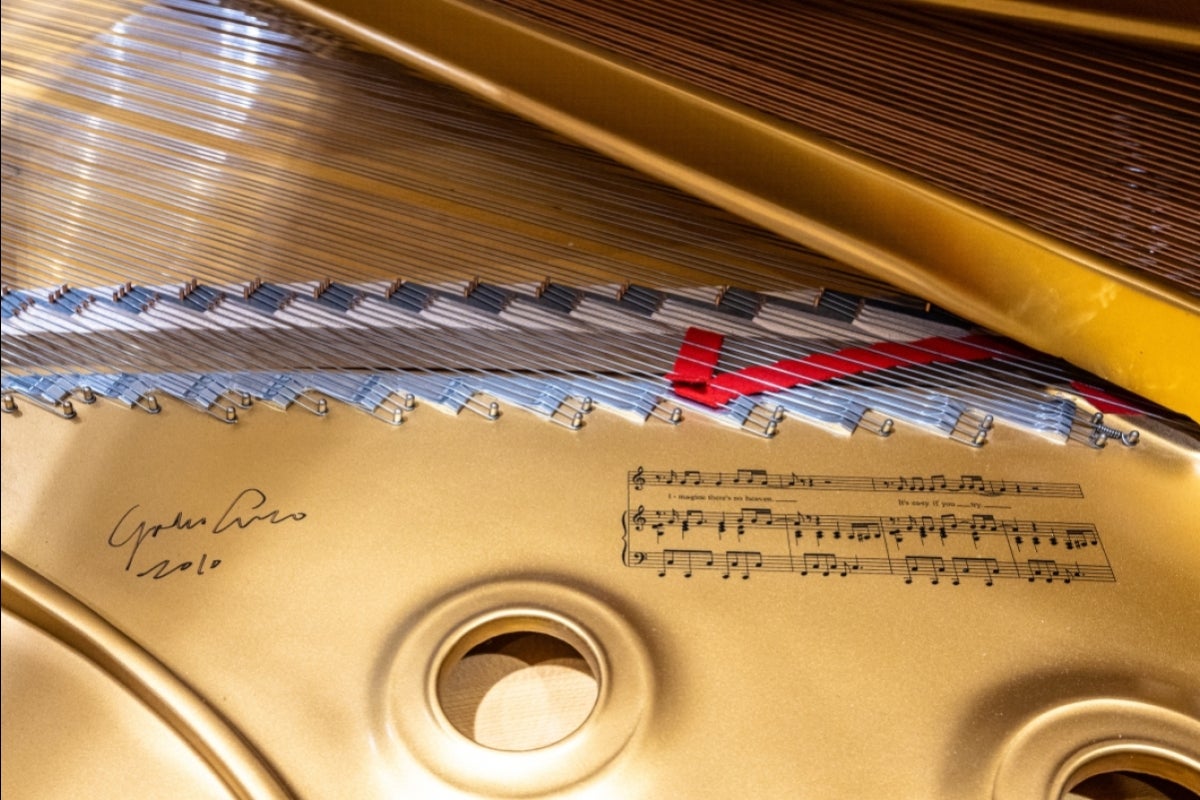Limited-edition 'Imagine' grand piano donated to Popular Music Program
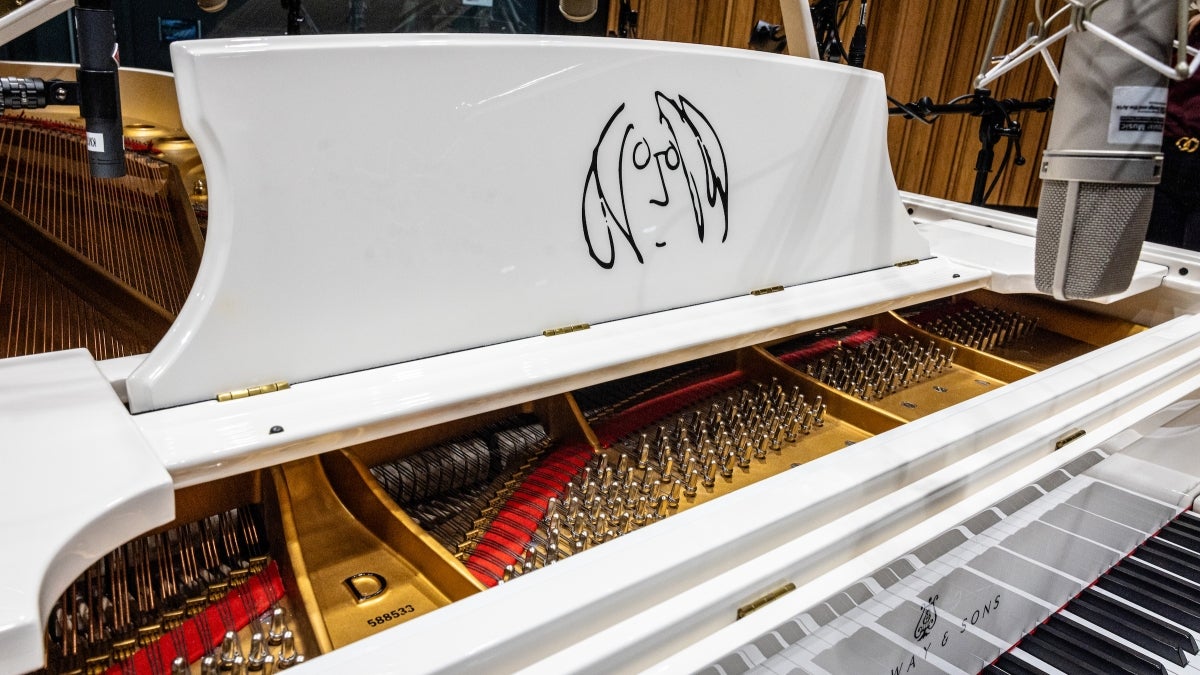
Editor’s note: This story is featured in the 2022 year in review.
Inside Arizona State University’s new high-rise building in downtown Phoenix sits the crown jewel of the Popular Music Program — a 9-foot, limited-edition John Lennon “Imagine” grand piano.
The spectacular instrument, signed by Yoko Ono, has an incredible history. The latest chapter in its story is its donation to ASU by alumna Jeanne Blanchet, an author and musician.
Now, the concert piano will be available to students and faculty in the School of Music, Dance and Theatre, as well as anyone who records in the new studio at the Fusion on First building.
Video by Ken Fagan/ASU News
Erin Barra, director of the Popular Music Program, said she was overjoyed when she heard about the donation.
“I was excited by the possibilities and what it signified and meant to have an instrument like this in our program,” she said.
“It’s really about what the piano represents, and to me it represents the power of a song and a dream, and in a lot of ways, what better north star for any student or anyone who gets to work in our spaces to signify along the journey of what is possible in your life and the power of music and songwriting.”
Blanchet had the piano for about a year before she decided to donate it to ASU.
“I loved it very much, but we moved into another place and there wasn’t really space for it. And it’s such a wonderful instrument, it should not just be in a private home tucked away into a corner of a room,” said Blanchet, who earned a master’s degree in art education from ASU.
“That’s when I thought it would make a nice donation,” she said, happy at the thought that students and faculty could enjoy it.
Jeanne Blanchet played the piano every day when it was in her home. But when she moved, she decided to donate the instrument to ASU, where it now resides in the new Fusion on First recording studio in downtown Phoenix. Photo by Charlie Leight/ASU News
‘I can’t believe this’
In 2010, the Steinway company produced 175 pianos in its limited-edition “Imagine” series to mark what would have been the 70th birthday of John Lennon, who was shot and killed in 1980.
The Imagine pianos were modeled after the white Steinway grand piano that Lennon presented to his wife, Yoko Ono, on her birthday in 1971.
ASU’s piano was the first one produced in the “D” models, the 9-foot grand pianos, and — like the others — includes a plate with the opening notes to the song “Imagine,” a plaque with Lennon’s signature and an illustration of Lennon on the music desk.
As Blanchet tells the story, the piano was bought by Bernadette Gietka, a Maryland woman who won a $183 million lottery in 2003. Gietka wanted Yoko Ono to autograph the piano, which Ono agreed to do after Gietka donated money to the John Lennon Educational Tour Bus project. As the story goes, Ono slipped into the Steinway production facility through a loading-dock door, autographed the piano with a Sharpie and slipped back out.
Gietka died in 2014, and the piano sat in a warehouse for several years until it made its way to a Steinway dealer, who placed it for sale on eBay, where Blanchet saw it.
“I thought, ‘I can’t believe this.’ So I pursued it,” she said.
She had the instrument shipped to her home in Scottsdale, where she played it every day.
“Since my background was in classical music, I played Chopin, Rachmaninoff and of course Beethoven, my favorite,” she said.
After Blanchet decided to make the donation to ASU, Rick Florence, the head piano technician for the School of Music, Dance and Theatre, visited Blanchet’s home to check out the piano.
“When I first sat down and played a few notes, it was obvious it was a very nice musical instrument. It had really nice tone, and it was in immaculate condition,” he said.
The piano arrived at the newly finished Fusion on First building in October. The piano movers took the legs off the body and wheeled it sideways into the room.
“Rows of students lined up to watch them move the piano in,” Barra said.
“Then there was a line to sit down and play it. I got to be the first person to play it, so that was very exciting.”
Rick Florence, the head piano technician for the School of Music, Dance and Theatre, rebuilt all the hammers of the "Imagine" piano in his shop on the Tempe campus. Photo by Charlie Leight/ASU News
In pristine shape
Not long after the piano arrived, Florence took it apart.
“One thing I couldn’t wait to do is get the piano action into my shop and optimize it so we could pull out all those great sounds that the piano is capable of making,” he said.
Florence removed the “action” of the piano — the keys, the hammers that hit the strings and the thousands of parts in between. The action slides out of a piano like a big drawer, so Florence could take it to his workshop on the Tempe campus. There, he milled all new hammers and then regulated the piano – using a balancing system that tweaks the ratio of the movement of the keys and hammers.
It’s a complicated and delicate interplay of physics that involves much more than just tuning, said Florence, a third-generation piano technician.
“When you have a piano tuned, you’re changing the tension of the strings. It doesn’t affect the other parts,” he said.
Tuning a piano without regulating it is like putting gas into your car but doing no other maintenance. All of the school’s pianos have a regular schedule of care.
The frequent attention is for the benefit of the performers, who have studied their craft for years.
“They’re at the mercy of the pianos, the venue, the skill of the technician and things that are totally out of their control, but they’re judged on how well they play,” he said.
“They deserve a piano that is in pristine shape.”
Carly Bates, a faculty associate who teaches piano in the Popular Music Program at ASU, played her own arrangement of "Imagine" at a recent recording session on the John Lennon "Imagine" piano. Photo by Charlie Leight/ASU News
‘An incredible experience’
The piano is in one of the three “live rooms” of the second-floor recording studio at Fusion on First. In designing the studio, ASU worked with the Walters-Storyk Design Group, which has designed many famous studios, including Jay Z’s Roc the Mic studio in New York.
“It’s acoustically impeccable. The floors are floated and it’s connected to two other live rooms, so we can be recording everything from a symphony orchestra to a single piano vocal,” said Barra, an assistant professor in the School of Music, Dance and Theatre.
The Popular Music Program, now in its fourth semester, has about 100 students, and Barra expects it to top out at around 250.
“The Popular Music Program is a contemporary, industry-focused program that holds space for all types of musicians, from traditional instrumentalists to students who express their musicianship through technology or composition,” she said.
“Our goal is to create lifelong learners, multidisciplinary individuals and entrepreneurial creative industry professionals.”
Barra recently organized a recording session for two students and two faculty members to experience playing the John Lennon piano. Each arranged their own version of “Imagine.”
Sophia Humbert, a second-year student with a big voice, said she’d never played anything like it.
“My hands were shaking the entire time, but it was an incredible experience,” she said.
Carly Bates, an ASU alum and a faculty associate in the Popular Music Program, said the piano was “rich and warm.”
“There’s a real specialness to the instrument that I wasn’t prepared for,” she said.
Lennon’s iconic song “Imagine” was released in 1971.
“I’ve been thinking a lot about the energy and the message of this song and its relevance today,” Bates said.
“I think it is really relevant to where we are in life in this moment, but also to these students, who are embarking on their lives and careers as artists, and it’s this call to imagine a future that doesn’t exist, which is kind of where they’re at right now as they are actively building that future.”
Top photo: ASU's Steinway "Imagine" grand piano, like all of the 175 instruments in the limited series, has an illustration of John Lennon on the music desk. Photo by Charlie Leight/ASU News
More Arts, humanities and education

ASU student finds connection to his family's history in dance archives
First-year graduate student Garrett Keeto was visiting the Cross-Cultural Dance Resources Collections at Arizona State University as part of a course project when he discovered something unexpected:…

ASU alumna makes her way back to the ASU Gammage stage for '¡azúcar!'
As the Los Angeles-based CONTRA-TIEMPO dance group prepares for its upcoming production “¡azúcar!” at ASU Gammage, for one member of the dance group it is also a nostalgic return to her home.Born in…

ASU FIDM professor wins international award for fantastical, sustainable creation
The horror of an ailing Earth inspired an Arizona State University fashion professor to create a fantastical garment out of sustainable, re-used and found materials that won a prestigious…

